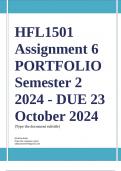HFL1501
Assignment 6
PORTFOLIO
Semester 2
2024 - DUE 23
October 2024
[Type the document subtitle]
[Pick the date]
[Type the company name]
tabbymwesh59@gmail.com
, Exam (elaborations)
HFL1501 Assignment 6 PORTFOLIO (COMPLETE
ANSWERS) Semester 2 2024 - DUE 23 October 2024
Course
Historical Foundations of South African Law (HFL1501)
Institution
University Of South Africa (Unisa)
Book
Historical Foundations of South African Private Law
HFL1501 Assignment 6 PORTFOLIO (COMPLETE ANSWERS) Semester 2
2024 - DUE 23 October 2024; 100% TRUSTED Complete, trusted solutions
and explanations. Ensure your success with us...
QUESTION 1 1.1 Name one South African constitution of which you have
learned in this module that embraced an approach of complete denial of the
principle of constitutionalism. (1) 1.2 Provide evidence from the Constitution of
the Republic of South Africa, 1996 that supports the statement that the current
South African governmental structure is not based on parliamentary
supremacy. (4) [5] QUESTION 2 2.1 Provide one valid example of each of the
following classifications of things: a) a consumable thing (1) b) a single thing
(1) c) res extra commercium (1) 2.2 Which form of delivery is applicable in the
following scenarios? a) André leases an office complex from Michelle for a
period of five years. Two years after the lease agreement is concluded,
Michelle puts the office complex on the market and André buys it. (1) b)
Orabile buys a 2022 Volkswagen Polo from a second-hand vehicle dealership.
Upon receipt of the purchase price, Juju, an employee of the dealership,
hands the keys of the vehicle to Orabile. (1) c) Lerato sells her car to Charles,
but the parties agree that Lerato will temporarily keep the car and lease it from
Charles for a period of two months before she delivers it to him. (1) [6]
QUESTION 3 Read the discussion of the facts provided in the media
summary of the Supreme Court of Appeal case of Special Investigating Unit v
Phomella Property Investments (Pty) Ltd and Another 2023 (5) SA 601 (SCA)
that is included at the end of this assessment in Annexure A. The questions
that follow test your understanding of the contents of the HFL1501 Study
Guide. It is not necessary to read the entire judgment, neither are you
, required to do any additional research on this case, or on the parties
concerned. Read only the discussion 3 provided below and answer the
following questions based on your understanding of what you have learnt in
this module: 3.1 Identify a term of the contract between the parties and state
whether this term is suspensive or resolutive in nature. (2) 3.2 Identify a
condition of the contract between the parties and state whether this condition
is suspensive or resolutive in nature. (2) 3.3 If you were a judge of appeal
hearing this matter, and it came before you on 3 April 2016, would you have
agreed with the SIU that the contract was not concluded legally? Explain your
reasoning in sufficient and specific detail, based on your understanding of the
common law as discussed in the HFL1501 study material. Your answer
should not exceed 200 words. (3) [7] QUESTION 4 Under modern South
African law, unlawful arrest qualifies as a form of iniuria. Name two
fundamental rights, entrenched in Chapter 2 of the Constitution, that may
possibly be infringed if a person is unlawfully arrested. (2) [2] QUESTION 5
Answer the following questions by relying on your knowledge of this module
and what you have learnt throughout the semester. In this question, you
should answer by giving your own opinion, but you must be able to motivate
each answer. Please write your answer for each question in full sentences.
5.1 Do you view our legal system differently now that you have completed this
module? If your answer is “yes”, explain what you have changed your mind
about, or what you have learnt. If your answer is “no”, explain which of your
earlier ideas has been confirmed. Limit your answer to 100 words. (3) 5.2 Did
you enjoy this module? If your answer is “yes”, explain what you liked best
about the module, the content, or how the module is presented. If you answer
“no”, you will not be penalised for doing so, but you must explain what you
disliked, or what the lecturers could have done differently that would have
changed your opinion of the module. Limit your answer to 60 words.
1.1 Name one South African constitution that embraced an
approach of complete denial of the principle of
constitutionalism. (1 mark)
The 1909 Union of South Africa Constitution is an example. It
established parliamentary sovereignty without constitutional
limitations on government powers.
1.2 Provide evidence from the Constitution of the Republic
of South Africa, 1996, that supports the statement that the




